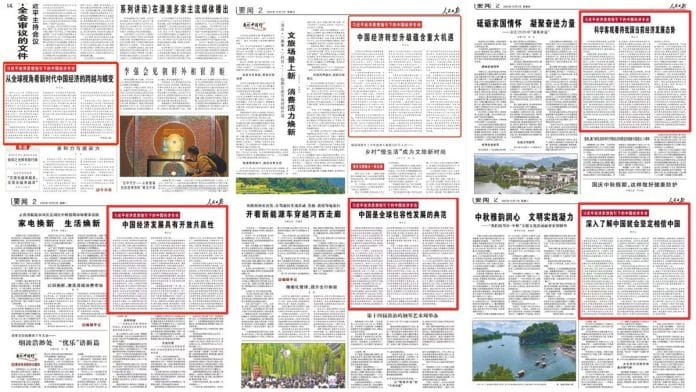As US President Donald Trump threatens new tariffs on China, Beijing’s response has been notable not just for retaliation, but also for its pre-emptive bid to steer the discourse.
Between 30 September and 7 October, People’s Daily, under the pseudonym “Zhong Caiwen”, published a series of eight editorials with the banner “Monograph on China’s Economy under the Guidance of Xi Jinping Economic Thought”. Together, the articles articulate China’s economic trajectory, emphasising innovation-driven, high-quality growth and long-term structural planning. They present China as a resilient actor in global economic governance, while addressing domestic priorities such as urban–rural integration, green transformation, and inclusive prosperity.
This deliberate narrative construction highlights China’s strategic use of state-owned media to shape both domestic confidence and international perception in a period of heightened geopolitical tension.
The Zhong Caiwen series encompasses the following headlines:
- The leap and butterfly change of China’s economy in the new era from a global perspective (30 September)
- Deeply understanding the internal logic of China’s long-term and stable economic development (1 October)
- Scientifically and objectively looking at our country’s current economic development trend (2 October)
- China’s economic transformation and upgrading contains major opportunities (3 October)
- Comprehensively understanding and grasping the certainty of China’s high-quality economic development (4 October)
- China is a model of global inclusive development (5 October)
- China’s economic development is open and win-win (6 October)
- A deeper understanding of China leads to firm belief in China (7 October)
Also Read: China launches K visa amid H-1B row. It is Beijing’s latest move to attract global talent
Zhong Caiwen — an old cog repurposed
On the Chinese internet, “Zhong Caiwen” has sparked discussion and debate. Observers note that the name is a homophonic abbreviation of a key monograph from the Central Financial and Economic Commission, designed to convey an official, high-level interpretation of economic policy. Much like the familiar People’s Daily pseudonym “Zhongsheng” in international commentary, Zhong Caiwen carries considerable signalling weight, showing that Beijing not only has its affairs in order but can also shape its narrative with precision and authority.
Zhong Caiwen is, however, far from a newcomer. In both English and Mandarin editions of People’s Daily, the pseudonym has countered Western narratives on China’s economy for years. In 2024, for example, Zhong challenged claims that China’s new energy sector was creating “overcapacity” and undermining global markets, highlighting US protectionist policies in the process. In another article last year, Zhong emphasised the need for China to unremittingly promote high-quality development, strengthen national economic and scientific capacity, and let “strange theories” about China crumble in the face of concrete achievements.
Pseudonyms are a familiar tool in Chinese media and statecraft. A Weibo user points out that while Zhong Caiwen is now widely recognised, others, like “Huangfu Ping” remain less known. The latter, a pseudonym in Shanghai’s Liberation Daily in 1991, symbolically supported Deng Xiaoping’s reform and opening-up policies during a turbulent period marked by the collapse of the Soviet Union and a resurgence of leftist ideology in China.
What sets the September-October series apart is its sustained, coordinated effort: eight consecutive days defending China’s economic resilience amid fresh US tariff threats. As a Baijiahao commentator on Baidu observed, such a high-level public opinion campaign is rare, attracting attention both at home and abroad. The series functions as both a confident message to domestic audiences and a diplomatic signal to the world that the Chinese economy is on the right path.
Also Read: China wants to lead, not create new world order, say Chinese analysts
‘Grace and power’ as strategy
The core goal of the series, according to some Chinese commentators, is not to discuss short-term stimulus, but to set the tone for the 15th Five-Year Plan. One vlogger described the series as showcasing “grace and power”, a message echoed by Weibo users who encouraged followers to read Zhong Caiwen’s latest articles. Another commentator argued that China is a giant ship and not a small sampan—with strong development resilience, enormous potential, and the confidence to navigate internal and external challenges. A contrast was also drawn with some Western countries, where social instability, gun violence, and systemic inequities make long-term planning far more precarious.
Published in both Mandarin and English, the editorials aim to bolster domestic trust in China’s economic governance and reshape global perceptions. The timing, during the National Day and Mid-Autumn Festival Holidays, just before the Fourth Plenary Session of the Central Committee, signals a clear counter-narrative to US pressure and underscores the far-reaching ambition of these pieces. The constant use of keywords like confidence, stability, win-win, openness, and inclusivity by Zhong Caiwen highlights China’s strategic messaging and its emerging approach to economic discourse.
Most importantly, the series accentuates China’s growing emphasis on narrative building. Pseudonyms like Zhong Caiwen are tools for projecting strength, competence, and even a touch of swagger. In trade spats and geopolitical manoeuvres alike, China weathers the storm with the power of its narrative.
Sana Hashmi is a fellow at the Taiwan-Asia Exchange Foundation. She tweets @sanahhashmi. Views are personal.






